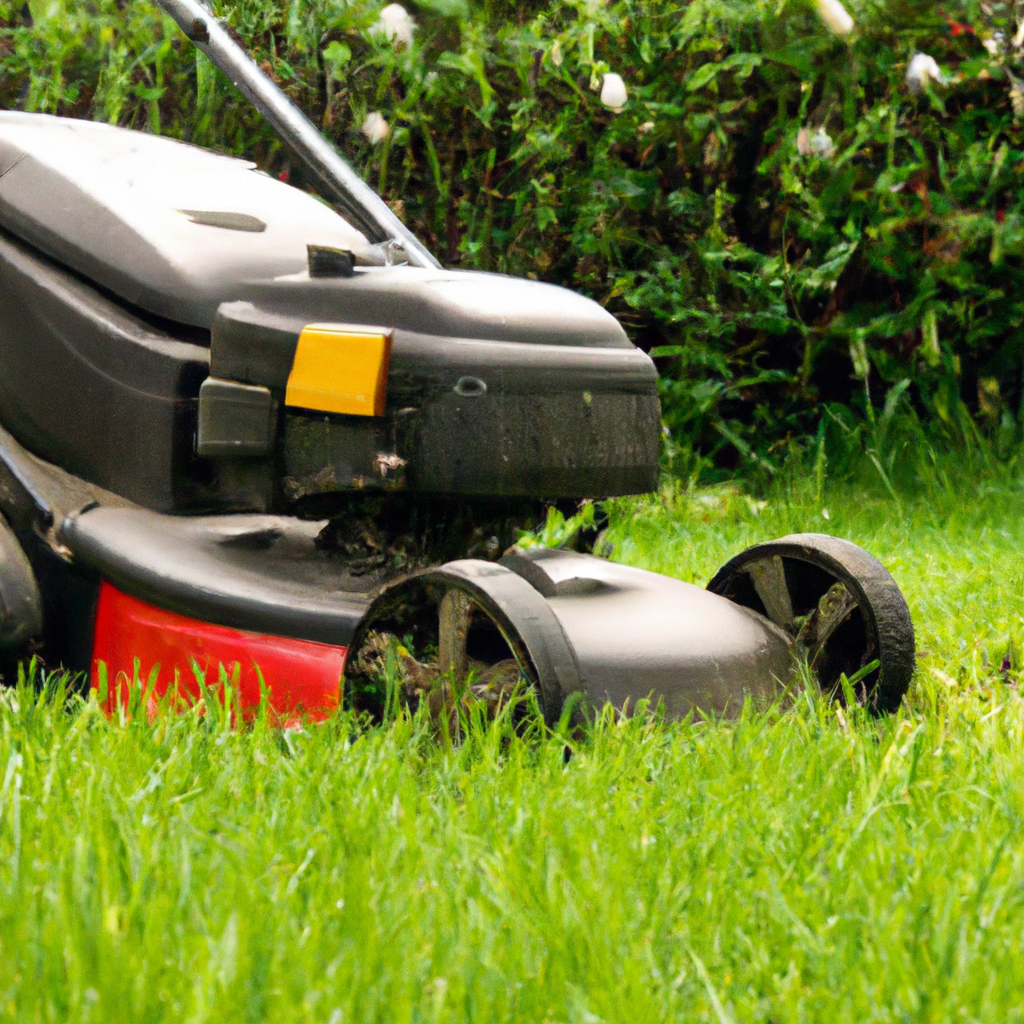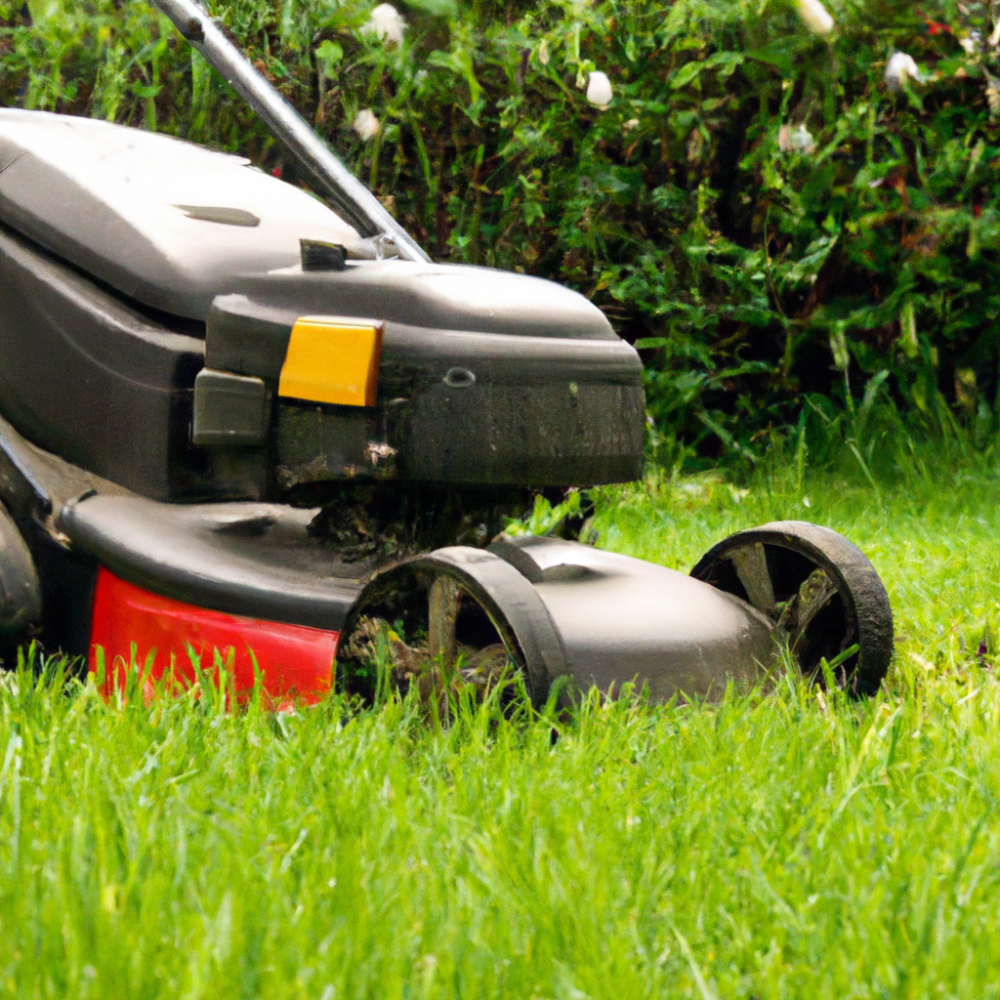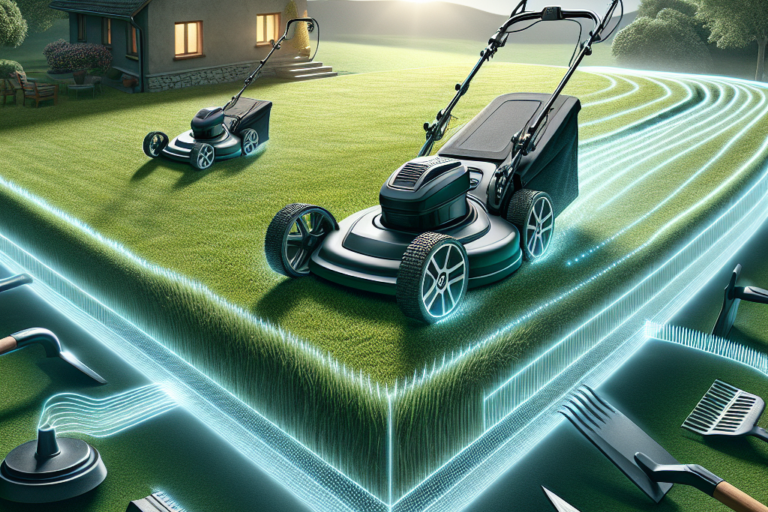Imagine stepping outside on a bright and sunny morning, ready to tackle the task of mowing your lawn. As you push your lawnmower across the grass, you notice the familiar hum of the engine. But what if there was a quieter alternative? In this article, we will explore the question of whether electric lawn mowers are indeed quieter than their gas-powered counterparts. So, grab a cup of coffee, sit back, and let’s find out if it’s time to switch to a quieter mowing experience.

Noise levels of electric lawn mowers
Comparing decibel ratings
When it comes to noise levels, electric lawn mowers are generally quieter than their gas-powered counterparts. Electric mowers typically have decibel ratings in the range of 60 to 75 decibels, which is comparable to a normal conversation or background music. This means that operating an electric lawn mower won’t disturb your neighbors or cause any unwanted noise pollution in your neighborhood.
Advantages of electric lawn mowers
Apart from their lower noise levels, electric lawn mowers have several other advantages. First and foremost, they are more environmentally friendly as they produce zero emissions during operation. This is a significant advantage over gas-powered mowers, which release harmful pollutants into the atmosphere. Electric mowers also require less maintenance as they don’t have engines that need regular tune-ups or oil changes. They are also easier to start, as they generally only require a push of a button.
Factors affecting noise levels
Various factors can influence the noise levels of electric lawn mowers. The design and construction of the mower’s blades, motor, and housing can all contribute to how much noise it generates. Additionally, the speed at which the blades rotate can also impact noise levels. Some electric mowers offer adjustable speed settings, allowing you to choose a lower speed for quieter operation. The materials used in the mower’s construction can also play a role in noise reduction, with some models utilizing sound-dampening materials to minimize noise.
Noise levels of gas-powered lawn mowers
Comparing decibel ratings
Gas-powered lawn mowers tend to be louder than electric mowers. Most gas mowers have decibel ratings ranging from 80 to 100 decibels, which is equivalent to the noise produced by a chainsaw or a busy street. This level of noise can be disruptive and bothersome, especially in residential areas where peace and quiet are valued. The higher noise levels of gas mowers can potentially lead to complaints from neighbors and create an unpleasant environment for both you and those around you.
Disadvantages of gas-powered lawn mowers
In addition to their higher noise levels, gas-powered mowers come with a few downsides. One major disadvantage is their environmental impact. Gas mowers emit pollutants such as carbon monoxide, nitrogen oxides, and volatile organic compounds, contributing to air pollution and climate change. Gas mowers also require regular maintenance, including oil changes, spark plug replacements, and carburetor adjustments. This ongoing maintenance can be time-consuming and costly, adding to the overall inconvenience of gas-powered mowers.
Factors affecting noise levels
Several factors can contribute to the noise levels of gas-powered lawn mowers. The engine design and size play a significant role, with larger engines generally producing more noise. The type of exhaust system used can also impact noise levels. Some gas mowers incorporate mufflers and sound-reducing components to reduce noise, but they may still be louder compared to electric mowers. Additionally, the condition of the mower, such as a worn-out muffler or blades, can contribute to increased noise levels.
Comparing noise levels
Actual noise measurements
To get a better understanding of the noise levels of electric and gas-powered lawn mowers, actual noise measurements can be conducted. Using a sound level meter, the decibel levels of different mowers can be measured at various distances. These measurements provide objective data that can be compared to determine the actual noise differences between electric and gas-powered mowers.
Subjective perception of noise
Aside from objective measurements, subjective perception should also be taken into account. People have varying tolerance levels when it comes to noise, and what may be acceptable to one person may be bothersome to another. However, it is generally agreed upon that electric mowers create less disturbance due to their lower noise levels.
Impact on neighborhood
The noise level of your lawn mower can have a direct impact on your neighborhood. Excessive noise from gas mowers can cause annoyance and frustration among neighbors, especially in residential areas where quiet is valued. This can lead to strained relationships and potential complaints. In contrast, using an electric mower allows you to maintain your lawn without disrupting the peace and tranquility of your community.
Environmental impact and noise
Emissions from gas-powered mowers
One of the major environmental concerns with gas-powered mowers is their emissions. Gas mowers emit pollutants that contribute to air pollution and are harmful to human health. Carbon monoxide, nitrogen oxides, and volatile organic compounds are released into the atmosphere when gasoline is burned. These pollutants can worsen air quality and have detrimental effects on the environment.
Eco-friendly nature of electric mowers
Electric mowers, on the other hand, are more environmentally friendly. Since they operate on electricity, they produce zero emissions during use. This not only reduces air pollution but also helps mitigate climate change. By choosing an electric lawn mower, you can contribute to the preservation of the environment and reduce your carbon footprint.
Quieter operation and environmental benefits
The quieter operation of electric mowers not only benefits your immediate surroundings but also contributes to a more peaceful environment. Reduced noise levels help to maintain the tranquility of your neighborhood and promote a healthier living environment for both humans and wildlife. Electric mowers can be seen as a more eco-conscious choice, as they support a quieter and cleaner environment.

Maintenance and noise
Regular maintenance of gas-powered mowers
Maintaining a gas-powered mower requires regular care and maintenance. This includes oil changes, spark plug replacements, air filter cleanings, and carburetor adjustments. Neglecting these maintenance tasks can lead to increased noise levels as the engine deteriorates over time. It’s important to follow the manufacturer’s recommendations for maintenance to ensure optimal performance and minimize noise.
Reduced maintenance requirements for electric mowers
Electric mowers are generally easier to maintain compared to gas-powered mowers. They don’t have engines that require the same level of upkeep, eliminating the need for oil changes or spark plug replacements. Electric mowers typically only require blade sharpening or replacement, occasional cleaning, and battery maintenance. The reduced maintenance requirements not only save you time but also contribute to a quieter and smoother operation.
Noise level implications
Regular maintenance can have a direct impact on noise levels. Well-maintained mowers generally operate more quietly as the engine and other components are in good working condition. Neglecting maintenance tasks can result in louder operation and potential damage to the mower, leading to even more noise issues. Proper and regular maintenance is key to ensuring a quieter and more enjoyable mowing experience.
Cost considerations
Initial cost of electric mowers
Electric mowers generally have a higher upfront cost compared to gas-powered mowers. The initial investment for an electric mower includes the cost of the mower itself, as well as any additional accessories such as batteries or chargers. However, it’s important to consider the long-term savings that can be achieved with an electric mower, such as lower fuel costs and reduced maintenance expenses.
Fuel costs for gas-powered mowers
Gas-powered mowers require fuel to operate, which adds to the ongoing expenses of maintaining a lawn. The cost of gasoline can vary, and the fuel consumption of gas mowers can be relatively high. This means you’ll need to purchase and refill gasoline more frequently, which can become costly over time. In comparison, electric mowers are powered by electricity, which is generally more cost-effective compared to gasoline.
Long-term savings
Although electric mowers may have a higher initial cost, they offer potential long-term savings. Electric mowers don’t require the same level of maintenance as gas-powered mowers, which can result in fewer repairs and lower maintenance expenses. Additionally, the cost of electricity is typically lower than gasoline, allowing you to save on fuel costs in the long run. Considering these factors, electric mowers can provide a cost-effective and efficient mowing solution.
Power and noise correlation
Horsepower comparison
Horsepower is often associated with the power and performance of lawn mowers. Gas-powered mowers tend to have higher horsepower ratings, which can directly impact their noise levels. More powerful engines generally produce more noise due to the increased combustion and mechanical processes occurring within them. In contrast, electric mowers typically have lower horsepower ratings, resulting in quieter operation.
Effects on noise levels
The power of a lawn mower’s engine directly affects its noise levels. Gas mowers with high horsepower ratings may generate more noise due to the increased power required to drive the blades and propel the mower. In comparison, electric mowers, which typically have lower horsepower ratings, operate more quietly. The correlation between power and noise levels reinforces the fact that electric mowers are generally quieter than their gas-powered counterparts.
Performance trade-offs
While electric mowers may be quieter than gas mowers, it’s important to consider the performance trade-offs. Gas-powered mowers often provide more cutting power, allowing for easier mowing of thick or overgrown grass. Electric mowers, while quieter, may require more passes over the same area to achieve the same results. However, advancements in electric mower technology have minimized these performance differences, making electric mowers a viable option for most residential lawn care needs.
Battery vs. corded electric mowers
Noise levels of battery-powered mowers
Battery-powered electric mowers have become increasingly popular due to their convenience and ease of use. These mowers are typically quieter than their corded counterparts, as they don’t rely on a direct connection to an external power source. Battery-powered mowers often have noise levels comparable to other electric mowers, operating at around 60 to 75 decibels. This makes them an excellent choice for those seeking quiet and efficient lawn maintenance.
Limitations of corded mowers
Corded electric mowers, while still quieter than gas-powered mowers, have some limitations when it comes to noise levels. These mowers require a direct connection to an electrical outlet, which means there is a cord that limits mobility and may create potential tripping hazards. Additionally, the presence of a power cord can increase the risk of accidental damage to the cord, leading to electrical hazards. However, advancements in cord management systems and cordless technology have helped alleviate these concerns.
Noise considerations in cordless vs. corded comparison
When choosing between cordless and corded mowers, noise considerations are important. Cordless mowers offer the advantage of enhanced mobility and ease of maneuverability, as they are not limited by a cord. However, the runtime of the battery can affect noise levels. As the battery depletes, the power to the motor may decrease, potentially resulting in increased noise levels. Corded mowers, on the other hand, provide continuous power, ensuring consistent performance and noise levels throughout the mowing process.
Consumer preferences
Demand for quieter mowing options
In recent years, there has been an increasing demand for quieter mowing options among consumers. As people become more conscious of their impact on the environment and the well-being of their communities, they are seeking alternatives to disruptive and polluting gas-powered mowers. The desire for quieter mowing options has led to the rise in popularity of electric mowers, which offer a quieter and more environmentally friendly alternative.
Factors influencing consumer choice
Several factors influence consumer choice when it comes to selecting a lawn mower. Noise levels are one of the key considerations for many consumers, as they want to maintain a peaceful environment for themselves and their neighbors. Other factors include the size of the lawn, ease of use, maintenance requirements, and cost-effectiveness. Electric mowers, with their quieter operation, ease of maintenance, and eco-friendly nature, often align with these consumer preferences.
Market trends
The market for lawn mowers has seen a significant shift in recent years. There has been a noticeable increase in the availability and variety of electric mowers, indicating a growing trend towards quieter and more sustainable lawn care options. Manufacturers are continuously improving the technology used in electric mowers, resulting in quieter operation, longer battery life, and improved cutting performance. These market trends reflect the changing consumer preferences and the desire for environmentally conscious and noise-reducing lawn maintenance solutions.
Conclusion
In conclusion, electric lawn mowers are generally quieter than gas-powered mowers. With decibel ratings ranging from 60 to 75, electric mowers offer a quieter and more peaceful mowing experience. They also provide several advantages such as reduced environmental impact, lower maintenance requirements, and long-term cost savings. Factors such as engine design, maintenance, and power levels contribute to the noise differences between electric and gas mowers. As consumer preferences shift towards quieter and more eco-friendly options, electric mowers have gained popularity in the market. By choosing an electric mower, you can enjoy a tranquil and efficient lawn care experience while contributing to a quieter and cleaner environment.



